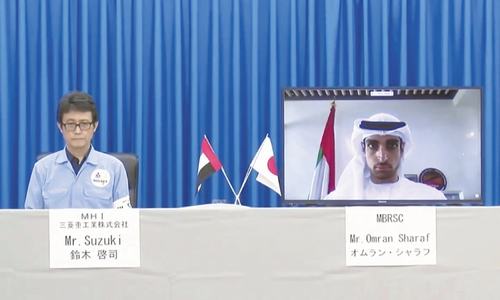The United Arab Emirates said it plans to launch its “Hope” Mars probe on Friday local time from Japan's Tanegashima Space Center after a two-day delay due to poor weather there.
A rocket is due to blast off at 5:43am local time (20:43 GMT Thursday) carrying the unmanned spacecraft that is bound to orbit the Red Planet in the Arab world's first interplanetary mission.
The launch was postponed from 20:51 GMT Tuesday because of inclement weather at the remote Japanese launch site, but remains well within the launch window which runs until August 13.
The Emirati project is one of three racing to Mars, including Tianwen-1 from China and Mars 2020 from the United States, taking advantage of the period when the Earth and Mars are nearest: some 55 million kilometres apart.
“Hope” — or Al-Amal in Arabic — is expected to reach Mars's orbit by February 2021, marking the 50th anniversary of the unification of the UAE, an alliance of seven emirates.
Once there, it will loop the planet for a whole Martian year, or 687 days.
The probe is expected to detach from the launch rocket about an hour after blast-off, which is when the UAE Mars mission's deputy project manager Sarah al-Amiri said the real excitement will begin.
“In my heart of hearts, I'm looking forward to the initial 24 hours after separation, and that's where we see the results of our work,” said Amiri, who is also Minister of State for Advanced Sciences.
“It is when we first get the signal, when we know that every part of the spacecraft is functioning, when the solar panels are deployed, when we hit our trajectory and are headed towards Mars,” she told AFP earlier this month.
Keiji Suzuki from Mitsubishi Heavy Industries, which is carrying the Hope probe into space, had already warned on Monday that thunderstorms forecast could delay the launch.
Big ambitions
The UAE — which is better known for its skyscrapers, palm-shaped islands and mega attractions — has in recent years been pushing to expand its space sector.
While the objective of the Mars mission is to provide a comprehensive image of the weather dynamics in the Red Planet's atmosphere, the probe is a foundation for a much bigger goal — building a human settlement on Mars within the next 100 years.
The UAE also wants the project to serve as a source of inspiration for Arab youth, in a region too often wracked by sectarian conflicts and economic crises.
Dubai has hired architects to imagine what a Martian city might look like and build it in its desert as “Science City”, at a cost of around 500 million dirhams ($135m).
And last September, Hazza al-Mansouri became the first Emirati in space, part of a three-member crew that blasted off on a Soyuz rocket from Kazakhstan, returning home after an eight-day mission in which he became the first Arab to visit the International Space Station.
Several dozen probes — most of them American — have set off for the Red Planet since the 1960s. Many never made it that far, or failed to land.
The drive to explore Mars flagged until the confirmation less than 10 years ago that water once flowed on its surface.
“What is unique about this mission is that for the first time the scientific community around the world will have an holistic view of the Martian atmosphere at different times of the day at different seasons,” the mission's project manager Omran Sharaf told Monday's briefing.
“We have a strategy to contribute to the global effort in developing technologies and science work that will help one day if humanity decides to put a human on Mars.”















































